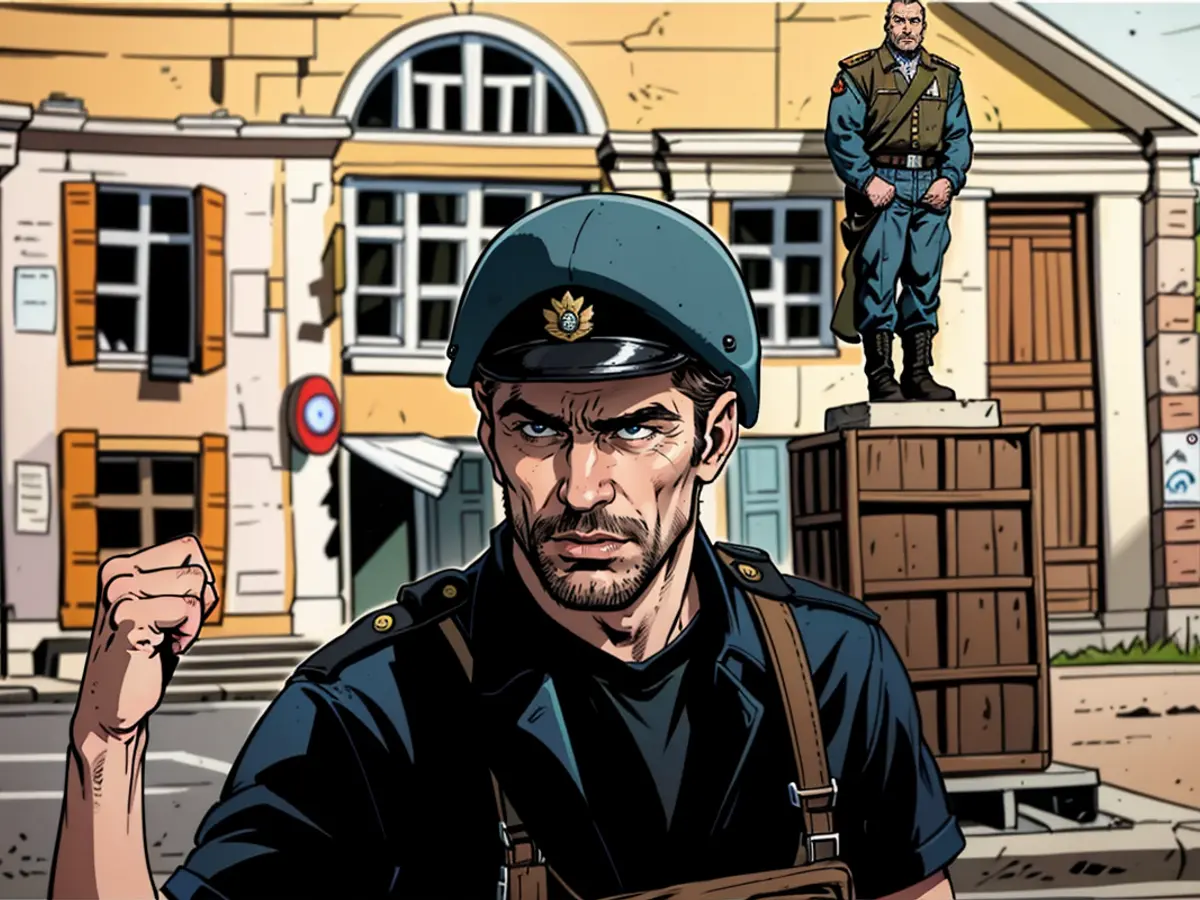Uncertainty and apprehension prevail in Kursk as local Russians seek refuge and Ukraine appears to make progress.
The scent of decay, within structures ripped apart.
This is a scene that Ukraine has grown accustomed to, yet it was foreign to Russia until now. The border town of Sudzha was attacked by Ukraine eleven days prior and declared under Ukrainian control by President Volodymyr Zelensky, as reported on Thursday. Russian President Vladimir Putin began a war of choice two years ago, unanticipating an invasion on their own soil since the Nazis.
CNN ventured into Russia along with the Ukrainian military, past the decimated border post that was destroyed during Ukraine's initial assault. Despite the occasional smoky skyline due to explosions in the distance, the road itself seemed eerily tranquil. The surroundings, once protected by a Cold War superpower that hadn't experienced an invasion since the Nazis, were now serene fields.
A turnoff into Sudzha was marked by a large Orthodox Christian cross that read, "God save and protect us." A couple of tanks and other armored vehicles, remnants of the fierce fighting days earlier, lay in ruins nearby.
The streets of Sudzha were mostly empty, yet the surrounding chaos was audible. Occasional gunfire and artillery broke the silence, but at a distance.
Our Ukrainian escort mentioned that the Russian attack drones, which have troubled Ukraine's progress on the front lines in the past months, were absent during this conflict. Their absence, along with that of Russian air power, hinted at an enhancement in Ukraine's abilities for this shocking offensive. The abundance of Western-supplied armor on the roads into Russia suggested that Ukraine was diverting resources it had previously claimed to lack into this battle.
Sudzha wasn't completely abandoned. At a large building, outside the basement entrance, a large cardboard sign stated, "Peaceful civilians in the basement – no military." Inna, 68, was seated outside, claiming that 60 other civilians were downstairs.
"They brought a lot of boxes, their food," she said, referring to the Ukrainian forces.
The basement was filled with a sight we've witnessed in countless Ukrainian towns over the past two years, and it never fails to be heartbreaking, even in Russia.
At the entrance of the shelter, Stanislav, with his gray beard, sullenly replied to inquiries about life. "See, this is not living. It is merely existing. It is not living."
In the stuffy, damp underground, the sick, lonely, and disoriented dwelled. An elderly woman, in her wig and bright red summer dress, swayed slightly as she muttered, "I don't know how it will end. At least a truce so we can live peacefully. We don't need anything. It's my crutch, I can't walk. It's very hard." Flies buzzed around her face in the muggy darkness.
A family of six was spotted in the next room, huddled in the light. The father stated, "A week. No news. We don't know what's happening around us." His son remained silent next to him, a marble-like expression on his face.
At the end of the corridor, Yefimov, reportedly in his 90s, was engaged in conversation with one of our Ukrainian escorts. Despite his family in Ukraine, he couldn't reach them.
"To Ukraine," he said, when asked where he would prefer to flee. "You are the first to suggest it. People have discussed it, but you are the first to bring it up." Escape would be a daunting task for many, even during peaceful times.
Outside, on the street, Nina, 74, was searching for her medication. The stores were obliterated, and pharmacies were closed. Despite her firm belief in staying where she's always lived, she insisted, "If I wanted to, I would. Why would I leave where I've lived for 50 years? My daughter and mother are in the graveyard, and my son was born here. My grandkids... I live on my land. I don't know where I live. I don't know whose land this is. I don't understand anything."
It's unclear how and where this rapid, successful, and unexpected assault will conclude, or when the Russian forces will arrive. Whatever the end may be, it will be too late to mend another wound to Russia's pride since the invasion that was supposed to last only a few days began in February 2022.
The conflict between Ukraine and Russia has escalated beyond Europe's borders, becoming a global concern. Despite Russia's assertion that it's defending its territorial integrity, the world has cupped its hand to its ears, listening closely to the sounds of war.







